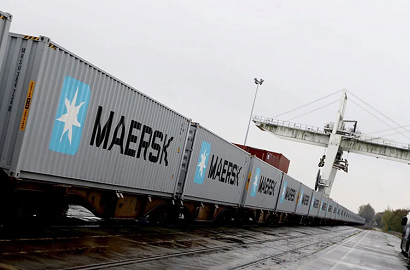Maersk, Renfe and Cepsa test biofuels for rail transport

The first test will run for three months on the non-electrified section of the track between Algeciras and Cordoba
Maersk, Renfe and Cepsa are working together on the first trial of second-generation biofuels for rail transport in Spain. This pilot test will generate technical, environmental and economic data for analysing the viability of sustainable fuels as an alternative to the conventional diesel used in rail transport on non-electrified lines.
The main objective is to decarbonise the rail corridor linking Algeciras (Cadiz) and Madrid. All that is needed to achieve this is to use renewable diesel on the non-electrified section of this route between the cities of Algeciras and Cordoba. The trains use sustainably sourced electricity to travel the rest of the route.
Five trips per week
As part of the trial, the Danish company, which specialises in container transport, will make the round trip between Algeciras and Cordoba to transport one of its customer’s cargoes five days a week for three months. Renfe Mercancías will provide the trains, with locomotives running on renewable diesel produced by Cepsa from used cooking oil.
The project will launch in early July. Cepsa will supply 160 tonnes of biofuel produced at its La Rábida Energy Park (Huelva). The trains will cover almost 40,000 kilometres and avoid the emission of over 600 tonnes of greenhouse gases, which would have been produced by conventional fuel.
Main arguments
A key advantage of second-generation biofuels is that they do not require engine modifications. This, together with a reduction of up to 90% in pollutant gas emissions and using the waste instead of sending it to landfill, are the main arguments in its favour. Maersk intends to offer this alternative to its customers if these fuels prove economically viable. The company announced this during a presentation with its two partners at the International Logistics Exhibition in Barcelona (SIL), which over 650 companies attended.
Managing Director of the Maersk Southwest Europe and Maghreb Area, Emilio de la Cruz, said that decarbonised transport solutions “are not only a differentiating factor for our customers but also a commitment to society. Consequently, we are working to offer solutions with very low greenhouse gas emissions across our entire operation". In view of the company's goal to be carbon neutral by 2040, he pointed out that “this innovative railway project in Spain is an important milestone in the context of a much bigger plan to achieve our goal of net zero emissions”.
Engine for change
Cepsa's Commercial Director for Renewable Energies, Carlos Giner, highlighted his company's desire to “be an engine for change and promote sustainability and decarbonisation for our customers across all types of transport: rail, sea, air and road”. He also explained, “This agreement with leading companies Maersk and Renfe expands our collaborative ecosystem by harnessing synergies to drive the energy transition and the fight against climate change.”
Last but not least, Managing Director of Renfe Mercancías Joaquín del Moral said that while the process of electrifying the railway network is advancing, “it is essential to explore possible alternatives to fossil fuels in trains that run on non-electrified lines, which currently account for approximately 35% of Spanish railways”. This will also give a second life to its diesel locomotives.
Photo: Maersk




